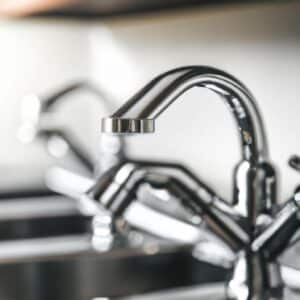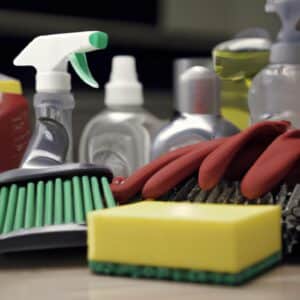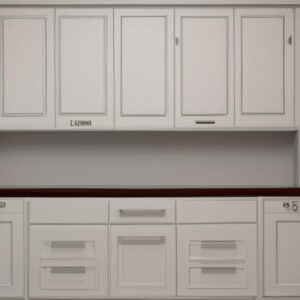Are you looking to keep your commercial kitchen safe and up to code? Deep cleaning is an essential part of that process. But what is deep cleaning, and how do you do it? Read on to learn about the importance of deep cleaning commercial kitchens, the key components that need to be cleaned, and the benefits of regular deep cleaning.
Deep cleaning isn’t the same as regular cleaning. It requires special attention to high-risk areas and surfaces that can harbor bacteria and grease, leading to health concerns and the risk of contamination. In a commercial kitchen, deep cleaning is essential to maintaining a safe and sanitary environment. It involves scrubbing, sanitizing, and wiping down surfaces, equipment, and fixtures. Additionally, grease trap maintenance, deep fryer cleaning, and exhaust system cleaning are also necessary for a complete deep clean.
But why go through the hassle? A regular deep cleaning helps keep your kitchen up to code, and it also helps you save time and money. Investing in your kitchen’s cleanliness now can help you avoid costly repairs down the road. So let’s dive in!
Grease Traps
Grease traps are an important part of commercial kitchen deep cleaning. They are designed to capture and contain grease, oil, and fat particles that can clog drains and create unsanitary conditions. Grease trap maintenance is key to keeping a kitchen running smoothly and safely. This includes regular cleaning, inspection, and removal of built-up grease and oil. Regular maintenance will help prevent foul odors, insect infestations, and blockages caused by grease and oil buildup. Grease trap maintenance is essential for ensuring risk-free food contact surfaces as well as a clean and sanitary kitchen environment.
Deep Fryers
Deep fryers are an essential part of commercial kitchen cleaning, as they are used for preparing food quickly and conveniently. It is important to regularly maintain deep fryers so that they remain in good working order. Deep fryers should be cleaned on a regular basis and all of their parts, including the oil pan, should be inspected for any blockages or damage. Deep fryers should be checked for any cracks, leaks, or any other damage to ensure that they are working properly. Proper maintenance will help keep the deep fryers running efficiently and safely. Deep fryers help to reduce the amount of time needed to prepare food, and they also help to reduce the risk of foodborne illnesses. Regularly cleaning and maintaining deep fryers will help to keep them in good working order and reduce the risk of any accidents or injuries in the kitchen.
Kitchen Equipment
Keeping commercial kitchen equipment properly maintained and clean is essential for any business in the food industry. This includes the proper cleaning and sanitizing of all kitchen equipment, from the grills to the cutting boards. Proper cleaning not only ensures that your kitchen equipment will last longer and perform better, but it also helps to prevent the spread of bacteria that can cause foodborne illnesses. A thorough cleaning of kitchen equipment should involve a three-step process: cleaning, sanitizing, and drying.
When it comes to cleaning kitchen equipment, it is important to use the right equipment for the job. A good cleaning solution, such as a degreaser or an all-purpose cleaner, should be used to break down any residue that has built up on the equipment. After the cleaning solution has been applied, scrub the equipment with a sponge or cloth to remove any remaining dirt or debris. Once the equipment is clean, it should be rinsed with water before being sanitized. Sanitizing is the process of killing off any bacteria that may be present on the equipment by using either heat or a chemical solution. Finally, the equipment should be dried completely to prevent any water spots from forming.
By following this three-step process, you can make sure that your kitchen equipment is clean and free from any harmful bacteria or residue. Regularly cleaning your kitchen equipment will also help extend the life of the equipment, saving you money in the long run.
Ice Machines
Ice machines are essential for any commercial kitchen, helping to keep food and beverages cool and fresh. Regular deep cleaning of ice machines is critical to ensure that they remain safe and efficient. Deep cleaning involves removing scale and corrosion, and sanitizing the interior and exterior surfaces. It also includes cleaning and replacing the air filter, and checking the water filter for debris. The importance of cleaning ice machines can’t be overstated, as it can help prevent the growth of bacteria, which can cause food spoilage and other issues. Regular deep cleaning will also help reduce energy costs by improving the efficiency of the ice machine. As part of the deep cleaning process, it is recommended to clean and sanitize all components of the ice machine, including the interior and exterior surfaces, the condenser coils, and the ice bin. Additionally, the water filter should be inspected and replaced if necessary. With regular deep cleaning of ice machines, commercial kitchens can maintain a safe and efficient environment that is conducive to providing quality food and drinks.
Coffee Makers
A coffee maker is a must-have for any commercial kitchen. It allows you to quickly and easily serve up delicious hot beverages to your customers and staff. But like any kitchen equipment, it needs to be deep cleaned on a regular basis. This involves cleaning the interior and exterior of the machine as well as the filter basket and coffee maker carafe.
Deep cleaning a coffee maker is essential to ensure the beverage it produces is of the highest quality and safe to consume. It also helps to reduce the risk of bacteria buildup and potential health hazards. A deep clean also extends the life of the machine, so it’s important to take the time to do it right.
Trash Cans
Trash cans are an integral part of commercial kitchen deep cleaning. Trash cans are designed to contain all of the debris and waste of a commercial kitchen. They are essential in keeping the kitchen clean and free of garbage. Properly maintained trash cans can help prevent the spread of bacteria and other contaminants.
Trash can maintenance is relatively simple and should be done on a regular basis. Trash cans should be emptied and wiped down regularly, and the lids should be washed to ensure that they are free of any lingering bacteria. In addition, trash cans should be lined with a trash bag so that any spills can easily be contained and disposed of.
Trash cans are an invaluable resource in a commercial kitchen. They help keep the kitchen clean and free of debris, while also helping to protect against the spread of bacteria. With regular maintenance, trash cans can help ensure that a commercial kitchen is clean and safe.
Art Equipment
Keeping art equipment clean and well-maintained is a must for any commercial kitchen. Art equipment can include anything from brushes and palettes to easels and paint canvases. When these items are in contact with food, there is a risk of contamination. It is essential that art equipment is cleaned regularly and thoroughly.
Deep cleaning art equipment requires the use of a disinfectant. When deep cleaning art equipment, it is important to make sure all brushes, palettes, and other items are thoroughly soaked in the disinfectant. After this, each item should be rinsed off and allowed to air dry. The benefit of regularly cleaning art equipment is that it reduces the risk of cross-contamination and keeps the food contact surfaces safe. This helps to ensure a healthy and safe working environment for all employees.
Exhaust System Cleaning
Exhaust system cleaning is a vital part of deep cleaning for commercial kitchens. It helps to ensure your kitchen remains safe by removing grease, dirt, and other contaminants from the air. Regular exhaust system cleaning can help prevent kitchen fires and other hazards. The process includes deep cleaning and sanitizing the fans, filters, and ducts. It should be done by a professional routine cleaning service.
When it comes to cleaning the exhaust system, it’s important to use the right cleaners and tools for the job. Grease traps should be emptied and cleaned regularly, and degreasers and degreasing agents should be used to remove tough grease and dirt from the fans, filters, and ducts. Specialized tools like ladders and scaffolding may be necessary to access the system. Professional cleaners and technicians have the experience and equipment to safely and effectively clean the exhaust system.
Regular exhaust system cleaning can help prevent kitchen fires and other hazards. It also helps to maintain a comfortable working environment, and can improve the air quality in the kitchen. Clean exhaust systems are essential for food safety, and a professional deep cleaning service can help to ensure your kitchen is safe and compliant.
Cleaning Rod
Cleaning rod is essential in any commercial kitchen, as it helps to keep the area clean and sanitized. It is an important tool for deep cleaning and allows you to access all the corners and hard-to-reach areas of your kitchen. The cleaning rod is a long, sturdy pole with a brush or cloth attachment at the end. It is used to reach and scrub the ceilings, walls, and floors of your kitchen, removing dirt, grease, and other debris that might be stuck in hard-to-reach areas. With the cleaning rod, you and your staff can easily clean the kitchen surfaces and keep them free from germs and bacteria.
The maintenance of the cleaning rod is vital to ensure it works properly. Regular cleaning and checking of the brush attachment will help to prevent any wear and tear. It is also important to inspect the rod frequently to check for any cracks or breakage. Keeping the cleaning rod in good condition is essential for keeping your commercial kitchen clean and safe for food contact surfaces.





